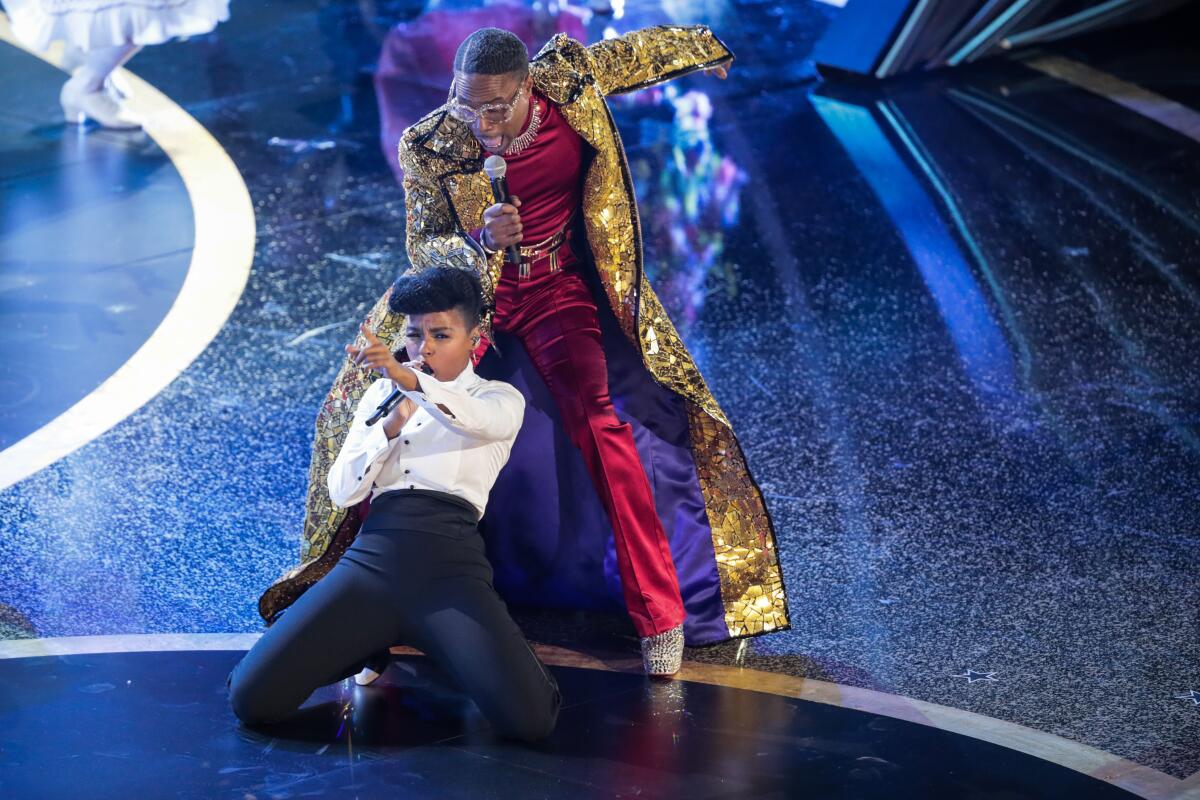Review: The Oscars ceremony fights its own irrelevance — by drawing attention to it

South Korea saved Hollywood from itself Sunday night when “Parasite” won the top prize at the 92nd Academy Awards, the culmination of a telecast that struggled to entertain let alone find relevance in the art form it was honoring.
To celebrate film’s biggest night, the Oscars relied heavily on talent imported from television, music and theater.
Welcome “Veep’s” Julia Louis-Dreyfus! Billie Eilish! Anthony Ramos of “Hamilton”! Most of the evening’s big winners, such as Laura Dern and Brad Pitt — who took home supporting acting honors for “Marriage Story” and “Once Upon a Time ... in Hollywood,” respectively — were easily predicted. And all the funniest stand-out moments in the three-hour telecast came when the show pointed out just how out of touch the academy is with the industry’s leading edge.
“It’s time to come alive, because the Oscars is so white,” sang Janelle Monáe in the show’s opening number, flanked by “Pose” star and Emmy winner Billy Porter. They highlighted the lack of diversity in Oscar categories by praising women, people of color and productions that were snubbed, in the song lyrics or in the costumes of the dancers onstage, some of whom were dressed as characters from “Dolemite Is My Name,” others as “Little Women.”
British actress Cynthia Erivo was the only person of color nominated for acting, and it was for playing a former slave, no less. For her role as freedom fighter and abolitionist Harriet Tubman in “Harriet,” she lost, as predicted, to Renée Zellweger, who played Judy Garland in “Judy.”
No women were nominated for the director award, and “Little Women’s” Greta Gerwig was among those snubbed.
Former Oscar hosts Chris Rock and Steve Martin, who made an appearance together early in Sunday’s show at the Dolby Theatre, joked about the academy’s failure to recognize those outside of its traditional go-to choices — white men. And though it’s a joke that’s growing old after so many missed opportunities, it was still fresher than the familiar faces who delivered familiar acceptance speeches thanks to the marathon of Oscar precursor awards they’d won.
“So many great directors this year,” said Rock.
“I don’t know Chris, I thought there was something missing this year,” responded Martin.
“Vaginas?”
“Yeah.”
The pair also picked up the #OscarsSoWhite thread and wove it into their short buddy act.
“Think how much the Oscars have changed in in the past 92 years,” said Martin. “Back in 1929, there were no black acting nominees.”
“And now in 2020, we got one,” said Rock.
“Amazing growth.”
Other presenters whose gags bested the speeches for entertainment value included “SNL” vets Maya Rudolph and Kristen Wiig and “Cats” stars James Corden and Rebel Wilson, who poked fun at 2019’s most notorious flop.
The generational and racial divide between those presenting and entertaining onstage and the majority of nominees and winners belied a tension in the academy. Reflecting the battle between “Parasite” and “1917,” the telecast pitted the new faces of pop culture against the old methodology of a studio system that’s been slow to catch up with the rest of the world.
So what did the show’s organizers do to make up for the lack of surprise, and color, in the award categories?
They organized a diverse array of presenters and guests from all over the entertainment universe: “Atlanta’s” Zazie Beetz. Spike Lee. Salma Hayek. In clips of footage and songs from previous winners, Sunday’s Oscars attempted to highlight films such as “Slumdog Millionaire,” “La Bamba” and “Moonlight” from years when a fresh perspective, or at least a new story or two, prevailed.
If the honors look predictable, put your surprises in the choreographed telecast.
Even on this front, there was at least one surprise that qualified as a head-scratcher: To the confusion of several in the crowd at the Dolby Theatre, rapper Eminem performed his Oscar-winning song “Lose Yourself” 17 years after the 2003 Oscar triumph.
It was telling that the ads during commercial breaks for forthcoming TV series such as “Genius: Aretha” and “Mrs. America” looked more innovative and in-touch than much of what the academy nominated this year.
No wonder Regina King, Reese Witherspoon and Nicole Kidman have defected, at least momentarily, to the small screen. Streamers like Apple TV+ and Netflix, which was up for 24 awards going into the Oscars this year, have a place for them, and it’s not just as a presenter.
Hollywood has no excuse for falling behind, or adhering to the old patterns of awarding the same films and same folks. Film celebrities have been some of the loudest proponents of inclusion, on all levels, and of pushing the ball forward creatively.
This year’s Oscars ceremony showed an art form in dire need of a relevancy check. Instead we got the biggest rap act of 2002 and a whole lot of jokes about the industry’s inability to see its own stasis.
More to Read
The complete guide to home viewing
Get Screen Gab for everything about the TV shows and streaming movies everyone’s talking about.
You may occasionally receive promotional content from the Los Angeles Times.








